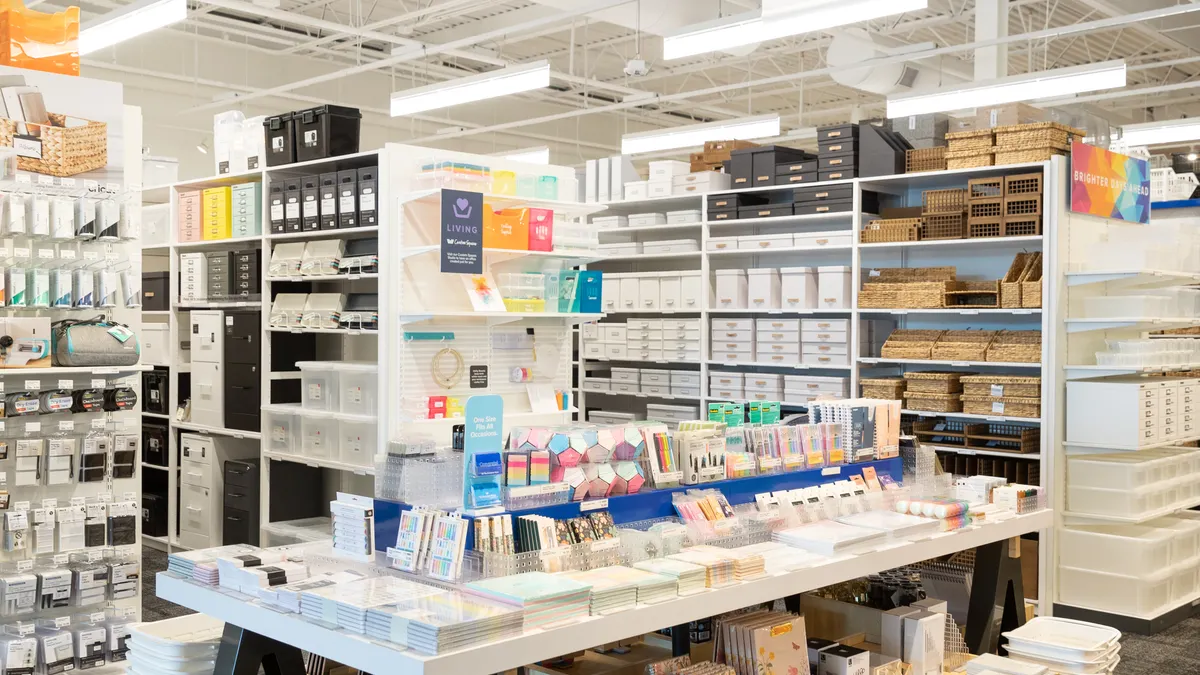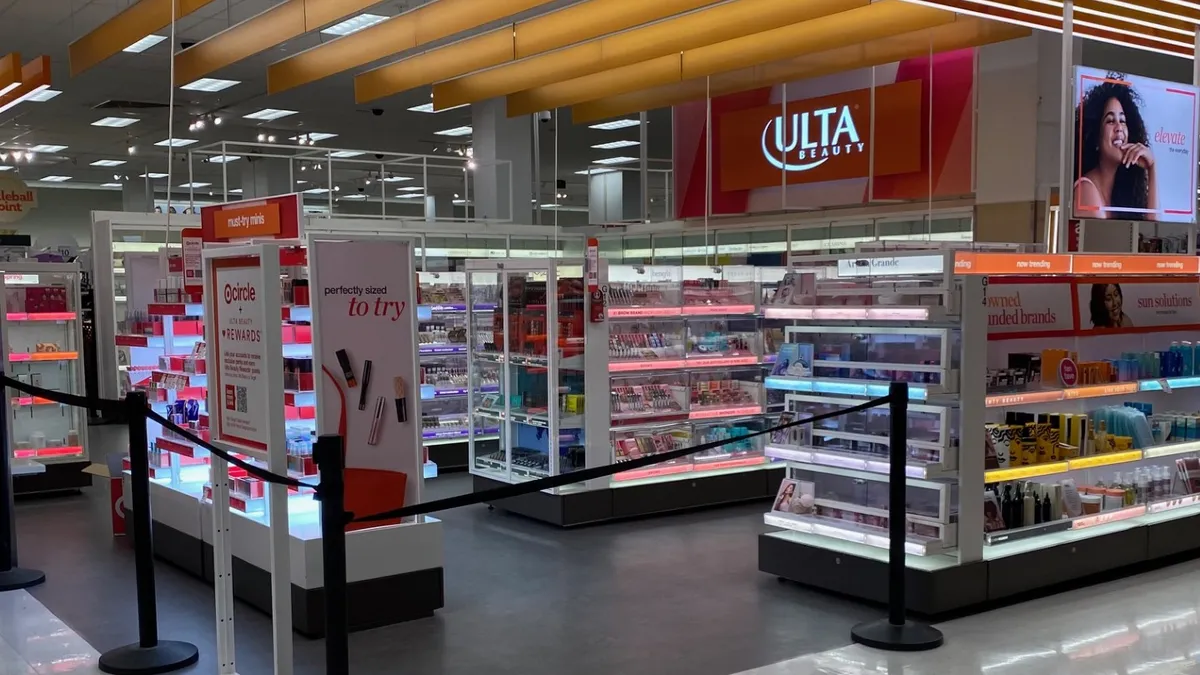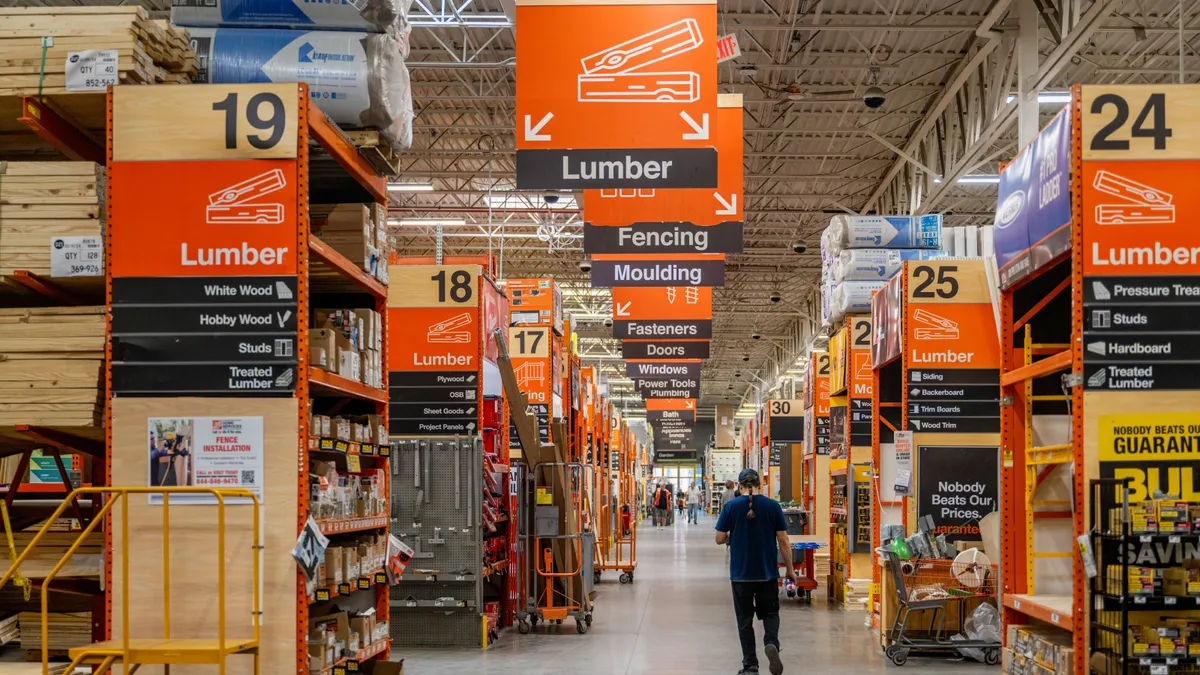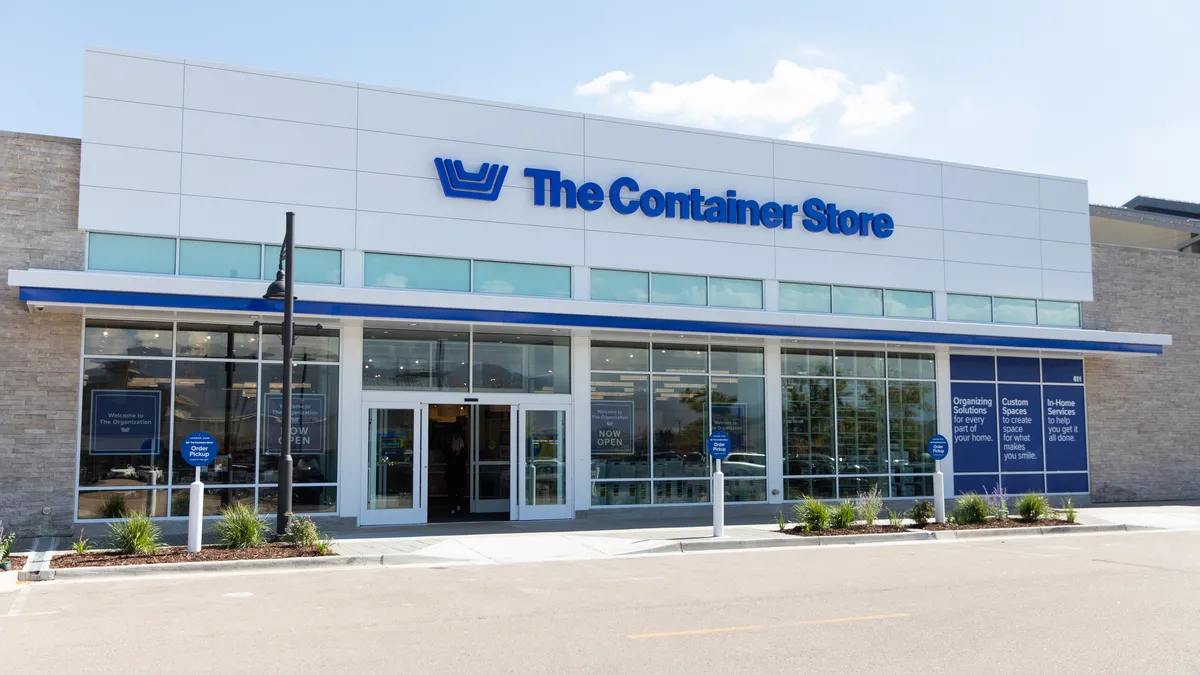By the first week of February 2020, warning lights were flashing for executives of big-and-tall apparel seller Destination XL Group. CEO Harvey Kanter had seen the effects of the SARS outbreak in Southeast Asia and other countries nearly two decades ago. As a new coronavirus outbreak began last year, Kanter could see signals of a major event building as he spoke with overseas business contacts.
The company cut travel by the third week of February and then started taking more dramatic measures. "We were cancelling orders and our vendors were saying, 'What are you doing?'" Kanter said in an interview. "When you've seen this story before, you know the playbook."
History showed Kanter and his team to be prescient, not crazy. Soon their peers were in line behind them trying to cancel orders with suppliers. One retailer after another began closing their footprints as the effort to combat the virus' spread in the U.S. began.
Those were weeks of emergency and stark uncertainty. While many retailers went through similar experiences, few had their businesses as thoroughly disrupted by the pandemic as those that specialize in suits, dresses, and more formal fashion and work clothing.
While many stores reopened later in the spring, much of the world remained closed. Office workers by and large stayed home. Schools cancelled proms. Couples put wedding parties on indefinite hold. Conferences, funerals, dinner parties were scaled down, transformed into virtual affairs or cancelled altogether. Without occasions to dress up for, occasion apparel went into a tailspin.
In that environment, Destination XL's top-line sales fell by nearly one-third during the fiscal year. But as with so many things, the trends of 2020 — the avoidance of stores, the decline of apparel spending, the trading down in clothing from formal categories to casual — weren't created by the pandemic so much as accelerated by it.
The rapid growth of e-commerce that occurred in 2020 is "analogous to the tailored category and the casualization of America," Kanter said. "There was an acceleration four-fold of casualization."
Dressing down
The company today known as Destination XL Group first launched in 1976. For the first two decades of its life, it operated solely in Levi Strauss-branded stores. In 2002, it acquired the then-largest big-and-tall apparel retailer in the U.S., Casual Male.
The company still operates nearly 70 Casual Male retail and outlet stores, but today its footprint is dominated by the Destination XL banner, launched in 2010 and which now accounts for more than 240 stores.
The DXL stores carry a wider assortment and three times the product offering as the Casual Male XL stores so that the retailer can, in its words, cater to a "diverse customer base, with merchandise representing all price points, from our higher-end brands to value-oriented brands, and all lifestyles, from business to denim."
Variety aside, workwear and suits are a meaningful but shrinking piece of DXL's business. As of August, tailored clothes represented 7% of the retailer's assortment after taking a pounding in sales during the year.
Men's suits are a roughly $1.4 billion market in the U.S., according to Euromonitor data sent to Retail Dive. Men's jackets, shirts, and shorts and trousers represent another $7.3 billion, $11.5 billion and $20.4 billion respectively.
Last year, men's apparel overall fell by 18% compared to 2019 but still held its roughly one-third share of total apparel sales, according to NPD Group data.
"With many occasions put on pause, and in some cases a switch to remote office jobs, we saw traditional career wear being hit the hardest," Maria Rugolo, head of NPD's Apparel Market Insights team, said in an email. "Categories like suits, dress pants, and dress shirts all declined more than 40% during this time."
The disruption in those markets began well before the pandemic as more offices loosened up their dress codes. Left to their own devices, it turns out a lot of men would prefer not to deal with the discomfort and cleaning expense of heavy woolen formal clothes.
Which is bad news for everybody that sells in the category. Last year, Tailored Brands (owner of Men's Wearhouse and Jos. A. Bank) filed for bankruptcy. After exiting in December, the company immediately ran into a cash crunch. J.C. Penney, Brooks Brothers, Neiman Marcus and J. Crew have also filed in the pandemic era, and plenty of other apparel retailers are struggling.
Crisis management
Destination XL has had financial difficulties of its own, which preceded the pandemic. The retailer operated at a loss in six out of the seven years between 2014 and 2020. For 2020, it posted an operating loss of $60.5 million — nearly 14 times 2019's figure — and a net loss of $64.5 million.
The company has made regular appearances on S&P Global Market Intelligence's list of most vulnerable publicly traded retailers. In March, S&P gave Destination XL a 19.1% chance of default over the next year and a 24.4% chance over the next two years.
Kanter said the company has been a "poster child" of supposedly impending bankruptcy for years, and yet it has so far been able to manage its finances outside of a Chapter 11 process.
"One of the things that really helped us is we're a small company and don't have a lot of bureaucracy or overhead. We were able to act very, very quickly and decisively with vendors and landlords."

Peter Stratton
CFO, Destination XL Group
The pandemic exacerbated the company's losses, but it also prompted Destination XL to cut costs out of its business. It cut its administrative expenses by more than $50 million during the year. The company also renegotiated more than 90 store leases, which executives said on an analyst call would save $5.2 million in 2021 and $13.5 million over the remaining life of the leases, according to a Seeking Alpha transcript.
Additionally the company has more than 130 store leases that expire or have a kick-out option that matures within the next two years. That means the company could cheaply exit unprofitable stores or negotiate more rent reductions with landlords to reduce its operating costs.
But while Destination XL has pared down its costs for a lower-sales environment, Pulse Ratings CEO Dennis Cantalupo described the cuts as "pretty severe." They include a 54% reduction in the company's field organization and a 29% cut to its corporate workforce. Since reopening, stores have been operating with "minimal staffing levels," Destination XL said in its latest 10-K.
Its quick moves to cancel orders in the very early stages of the COVID-19 crisis put the retailer in a stronger inventory position than it might otherwise have faced. "One of the things that really helped us is we're a small company and don't have a lot of bureaucracy or overhead," said Chief Financial Officer Peter Stratton in an interview. "We were able to act very, very quickly and decisively with vendors and landlords."
Shipment cancellations early last year made a "huge difference" and ensured the company didn't have to mothball inventory or go on a mass discounting spree to liquidate it, according to Stratton. Although the company was more promotional "than we would like to be" in the spring and early summer last year to keep product flowing through its online store, Stratton added.
The retailer's fast-moving approach may have also spared crucial relationships during a period of strain between retailers and vendors.
"I think management did an excellent job of navigating through a very difficult 2020," Cantalupo said. "They worked closely with suppliers and landlords to make sure they had enough liquidity to get through the year. The feedback we've received from suppliers was that DXL was extremely transparent. When they said something, they followed through with it. They gained a lot of confidence in the supplier community."
'There will be weddings'
As 2021 winds on, foot traffic to DXL's stores has increased, and Kanter has told analysts anecdotally that customers are proudly sharing their vaccine news and returning to stores.
With demand still uncertain, Kanter told Retail Dive the company is still "chasing goods" and being conservative with its shipments. "What we don't want to do is get ahead of our skis." As vaccinations drive store traffic, so too do executives expect men more broadly to return to offices and the events that drive spending on suits and other tailored clothing. "I'm happy to say there will be weddings, and unfortunately will be funerals," Kanter said.
Along with traffic improvements, the company got some financial breathing room with a new term loan that effectively pushes out debt maturities and adds some liquidity.
Access to capital can be the difference maker between a turnaround and a crisis. However, RapidRatings Chairman and CEO James Gellert noted in an interview that Destination XL's new loan "just lets them kick the can down the road a little bit." He added later by email that the loan "probably isn't large enough to completely restructure the company, overhaul the business, or existentially change the trajectory of the last five years."
The company's woes may not be over, as it will be selling into a still-uncertain market given that apparel's role in the new world still isn't settled.
"All eyes are still on how consumers return back to their offices within the next few months," NPD's Rugolo said. "Comfortable and versatile offerings will be key as this switch back could also allow for more hybrid work schedules."
Moreover, the new post-vaccine reality, whatever it may be, isn't quite here yet. "It's a difficult market, selling work attire — we're not fully back to the office," Cantalupo said.
Kanter and Stratton both think the tailored market will bounce back. "Customers like the flexibility to work from home, wear a fleece and pair of jeans," Stratton said. "But there are customers that just like to dress up."
There is also the possibility of the fabled consumer "revenge" spending that retailers have pined for. "I think the suit market is going to have some pent-up demand, and pent-up weddings, especially all the weddings that were cancelled," Cantalupo said. "There is some tailwind that comes with the fitted suits market. Does it move the needle? That remains to be seen."
The company's deeper problems began and dogged the company prior to the pandemic, which raises questions about DXL's ultimate ability to turn its trends around.
"While Destination XL may be banking on a resurgence in foot traffic and post-vaccine consumer spending, their underlying fundamentals and track record over the past few years might yield a less rosy trajectory — one that looks more akin to other specialty retailers, like Francesca's, that failed to grow customer bases or successfully move from brick and mortar to digital sales — way before the pandemic started impacting top lines," Gellert said.
Tailoring to a submarket
While Destination XL and its peers in the suit space have adjusted to the casual era by adjusting their assortments accordingly, more casual wear puts them in a much larger cohort of apparel sellers. It's a group that includes discount powerhouses like TJX Cos, Ross Stores, Target and Walmart, all of which have disrupted the space to varying degrees. Not to mention Amazon, department stores and every other apparel seller.
"Tailor Brands and DXL did a good job of serving the needs of their shopper. When you go more casual, what differentiates you from Ross Sores, T.J. Maxx, Macy's and the department stores?" Cantalupo said. "That's the concern I would have. If you're going away from workwear, which is your bread and butter, what differentiates you from everybody else?"
One potential advantage Destination XL has over other suit and workwear sellers is there in its name: a specialization in big-and-tall apparel. Competitors in that space include many of those that also offer suits and tailored clothing, including Tailored Brands and J.C. Penney. The latter in recent years has tapped basketball icon Shaquille O'Neal to market its big-and-tall clothing including with his line. Plenty of the apparel sellers listed above have big-and-tall offerings, but none of them have built their business around them.
"Factually, we are the largest big-and-tall player in the space, period," Stratton said. "Unlike women's apparel in special sizes where there are many places to shop, in our space there are not that many, and very few that specialize. We believe we are in a very unique and enviable position to grow our business."
Stratton also noted that 90% of every transaction the retailer processes runs through its loyalty program, meaning the company has deep data on its customers, where they live, how they spend, how they might respond if a DXL store closes. All of that data is also a major asset as more sales shift online and can help deepen its relationship with its audience.
Specialization, then, may be DXL's salvation. But salvation hasn't come yet, and pulling off a turnaround is a bigger imperative then ever after last year's deep wounds to the market, as well as the company's top and bottom lines.






















